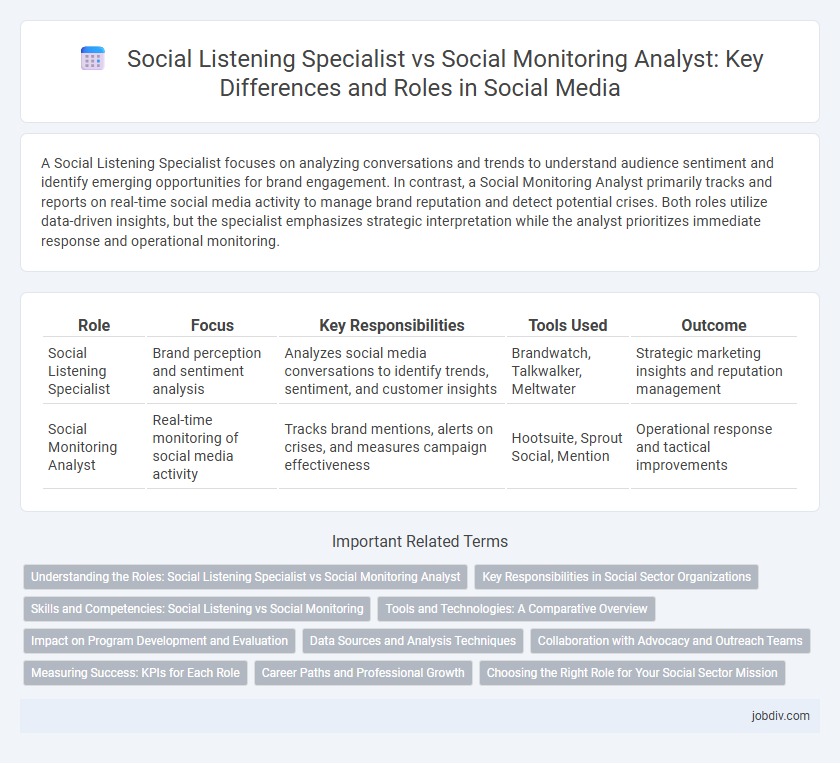A Social Listening Specialist focuses on analyzing conversations and trends to understand audience sentiment and identify emerging opportunities for brand engagement. In contrast, a Social Monitoring Analyst primarily tracks and reports on real-time social media activity to manage brand reputation and detect potential crises. Both roles utilize data-driven insights, but the specialist emphasizes strategic interpretation while the analyst prioritizes immediate response and operational monitoring.
Table of Comparison
| Role | Focus | Key Responsibilities | Tools Used | Outcome |
|---|---|---|---|---|
| Social Listening Specialist | Brand perception and sentiment analysis | Analyzes social media conversations to identify trends, sentiment, and customer insights | Brandwatch, Talkwalker, Meltwater | Strategic marketing insights and reputation management |
| Social Monitoring Analyst | Real-time monitoring of social media activity | Tracks brand mentions, alerts on crises, and measures campaign effectiveness | Hootsuite, Sprout Social, Mention | Operational response and tactical improvements |
Understanding the Roles: Social Listening Specialist vs Social Monitoring Analyst
Social Listening Specialists analyze consumer conversations across digital platforms to identify trends, sentiment, and emerging topics that influence brand strategy. Social Monitoring Analysts focus on tracking real-time online mentions and metrics to manage brand reputation and respond to immediate customer feedback. Both roles use social media analytics tools but differ in scope, where listening emphasizes strategic insights and monitoring prioritizes operational response.
Key Responsibilities in Social Sector Organizations
A Social Listening Specialist analyzes audience sentiment and trends by interpreting large volumes of social media data to inform strategic decision-making and brand positioning in social sector organizations. A Social Monitoring Analyst focuses on real-time tracking of social media platforms to identify emerging issues, respond to stakeholders, and measure campaign performance. Both roles contribute to enhancing community engagement and improving organizational impact through data-driven insights.
Skills and Competencies: Social Listening vs Social Monitoring
A Social Listening Specialist excels in interpreting complex data from social media conversations to identify trends, sentiment, and consumer insights, requiring advanced skills in sentiment analysis, natural language processing, and strategic thinking. In contrast, a Social Monitoring Analyst focuses on real-time tracking of brand mentions, competitor activities, and crisis detection, necessitating proficiency in data aggregation tools, alert systems, and quick response evaluation. Both roles demand strong analytical abilities, but Social Listening emphasizes deep contextual understanding while Social Monitoring prioritizes immediate brand protection and awareness.
Tools and Technologies: A Comparative Overview
Social Listening Specialists leverage advanced AI-driven platforms like Brandwatch and Talkwalker to analyze sentiment, track brand perception, and uncover emerging trends across diverse social channels. Social Monitoring Analysts primarily use real-time alert tools such as Hootsuite and Sprout Social to identify customer feedback and manage brand reputation through immediate response mechanisms. While both roles utilize analytics dashboards, Social Listening Specialists emphasize predictive analytics and deep data mining, whereas Social Monitoring Analysts focus on operational monitoring and issue resolution workflows.
Impact on Program Development and Evaluation
Social Listening Specialists analyze consumer sentiment and identify emerging trends to inform strategic program development, driving innovation and relevance. Social Monitoring Analysts track real-time data and key performance indicators to evaluate ongoing program effectiveness and ensure timely adjustments. The synergy between social listening and monitoring enhances comprehensive program evaluation and continuous improvement.
Data Sources and Analysis Techniques
A Social Listening Specialist primarily utilizes diverse data sources including social media platforms, blogs, forums, and news outlets to capture a broad spectrum of online conversations, employing advanced sentiment analysis and natural language processing techniques for deep contextual understanding. In contrast, a Social Monitoring Analyst focuses on real-time data from specific social channels, using keyword tracking, trend analysis, and metric-based performance indicators to measure engagement and brand mentions. Both roles leverage machine learning algorithms, but Social Listening Specialists emphasize qualitative insights while Monitoring Analysts prioritize quantitative data for actionable reporting.
Collaboration with Advocacy and Outreach Teams
Social Listening Specialists and Social Monitoring Analysts play distinct but complementary roles in collaboration with Advocacy and Outreach Teams. Social Listening Specialists provide deep insights by analyzing sentiment trends and emerging topics, enabling Advocacy teams to tailor messaging that resonates with target audiences. Social Monitoring Analysts track real-time social media activity and engagement metrics, supporting Outreach teams in promptly addressing community concerns and optimizing campaign responsiveness.
Measuring Success: KPIs for Each Role
A Social Listening Specialist measures success through KPIs such as sentiment analysis accuracy, share of voice, and trend identification efficiency, providing deep insights into brand perception and market shifts. In contrast, a Social Monitoring Analyst focuses on real-time KPIs like response time, volume of mentions tracked, and issue resolution rates to ensure prompt engagement and risk mitigation. Both roles utilize data-driven metrics but differ in their strategic focus, with listening emphasizing long-term trends and monitoring prioritizing immediate social media interactions.
Career Paths and Professional Growth
A Social Listening Specialist analyzes consumer sentiment and market trends using advanced tools, enabling strategic decision-making and brand positioning. A Social Monitoring Analyst focuses on real-time tracking of social media mentions and customer interactions, providing immediate response insights and risk management. Career growth for Social Listening Specialists often leads to roles in brand strategy and market research, while Social Monitoring Analysts may progress into reputation management and crisis communication leadership.
Choosing the Right Role for Your Social Sector Mission
A Social Listening Specialist analyzes consumer sentiment, emerging trends, and brand perception through advanced data interpretation, enabling strategic decisions that align with social sector goals. A Social Monitoring Analyst focuses on real-time tracking of social mentions, engagement metrics, and crisis alerts to maintain active community management and responsiveness. Selecting the right role depends on whether your mission prioritizes in-depth insights for long-term strategy or immediate reaction to social media dynamics.
Social Listening Specialist vs Social Monitoring Analyst Infographic

 jobdiv.com
jobdiv.com